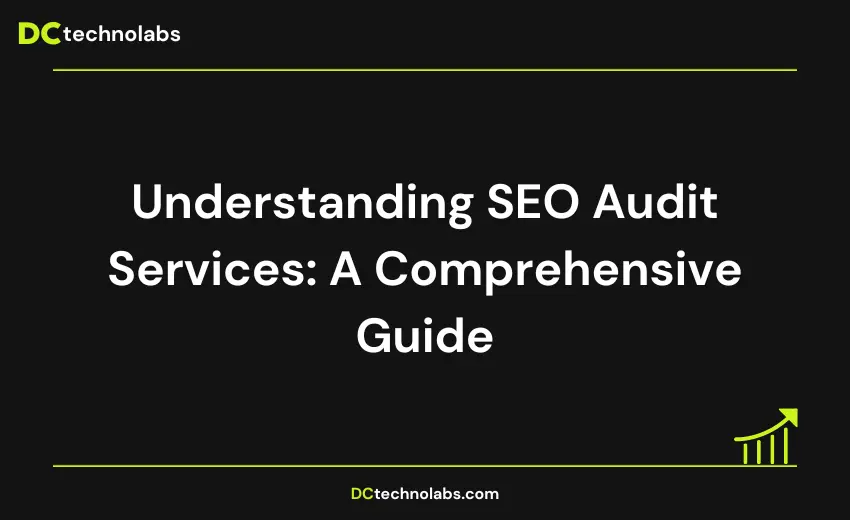
In today’s digital world, maintaining a strong online presence is crucial for businesses of all sizes. SEO audit services can help in making sure that your website is search engine optimized, as it is one of the most important components. Your site’s performance may be hampered, but you may find and fix these problems by performing an SEO audit. In this guide, we’ll explore what SEO audit services entail, the different types of audits, and why they are important for your website.
Table of Contents
What is an SEO Audit?
An SEO audit is a thorough analysis of your website’s performance in search engine results. It aims to identify strengths and weaknesses in your current SEO strategy, uncover technical issues, and provide actionable insights for improvement. Essentially, an SEO audit acts as a health check for your website, helping you understand how well it is optimized for search engines and what steps you can take to enhance its visibility.
Analyzing Website Performance
An SEO audit starts by evaluating how your website performs in search engine results. This includes looking at your current rankings for various keywords, the amount of organic traffic your site receives, and user engagement metrics like bounce rate and time spent on the site. You may determine how well your website is performing right now and where it might be able to be improved by knowing these characteristics.
Identifying Strengths and Weaknesses
One of the main goals of an SEO audit is to pinpoint both the strengths and weaknesses of your current SEO strategy. Strengths might include well-optimized pages, high-quality backlinks, and effective use of keywords. Weaknesses could involve slow page load times, broken links, or poor mobile optimization. By identifying these areas, you can leverage your strengths and address your weaknesses to improve overall performance.
Uncovering Technical Issues
Technical issues can significantly impact your site’s ability to rank well in search engine results. During an SEO audit, these issues are identified and analyzed. Common technical issues include slow page loading speeds, problems with mobile responsiveness, and issues with site security (such as missing SSL certificates). Resolving these technological issues can improve your site’s visibility by facilitating search engines’ easy crawling and indexing of your content.
Providing Actionable Insights
After identifying the strengths, weaknesses, and technical issues of your site, an SEO audit provides actionable insights and recommendations. These insights are practical steps you can take to improve your site’s SEO. For example, if your site has slow loading times, the audit might suggest optimizing images, using a content delivery network (CDN), or minifying CSS and JavaScript files. If there are issues with keyword optimization, the audit might recommend better keyword research and implementation strategies.
Acting as a Health Check
In general, an SEO audit functions as a thorough examination of your website. Just like regular medical check-ups can help maintain your physical health, regular SEO audits can help maintain your website’s health. By regularly conducting SEO audits, you can ensure that your site stays optimized for search engines, adapts to changing SEO trends and algorithms, and continues to attract and engage visitors.
Components of an SEO Audit
An SEO audit is essential for understanding the current state of your website’s SEO and identifying areas for improvement. The audit process can be divided into several key components, each focusing on different aspects of your site’s SEO health.
On-Page SEO Audit
An on-page SEO audit focuses on elements within your website that impact its search engine rankings. This type of audit examines the following critical factors:
Content and Structure
- Relevance and Quality: It is crucial to ensure that your website content is relevant to your target audience and of high quality. This means providing valuable information that answers users’ questions and meets their needs. Quality content typically gets higher organic search engine rankings and more visits.
- Proper Structure: The way your content is organized also affects its performance. A well-structured website uses clear headings, subheadings, and paragraphs to make the content easy to read and navigate. Properly structured content helps search engines understand the context and relevance of your content, improving your chances of ranking higher.
Keywords and Meta Tags
- Keyword Usage: Effective use of keywords is vital for SEO. In order to do this, make sure that your text, headings, and titles all naturally contain relevant keywords. Overusing or “stuffing” keywords can harm your SEO, so it’s important to use them thoughtfully.
- Meta Tags: Meta tags, including title tags and meta descriptions, play a significant role in how search engines and users perceive your website. A good meta title and description should accurately describe the page content and include primary keywords to improve click-through rates.
User Experience
- Navigation: Easy-to-navigate websites provide a better user experience, keeping visitors on your site longer and reducing bounce rates. A clear, intuitive menu and logical site structure are essential.
- Readability: Ensuring that your content is easy to read and understand is important. This includes using appropriate font sizes, bullet points, and short paragraphs. Readable content helps retain visitors and encourages them to explore more of your site.
Technical SEO Audit
A technical SEO audit examines the backend aspects of your website that affect its ability to be crawled and indexed by search engines. Key areas include:
Website Speed and Performance
- Loading Speed: A fast-loading website provides a better user experience and is favoured by search engines. Users may become irritated with slow websites, which might increase bounce rates. You may find and address speed issues with the help of tools such as Google PageSpeed Insights.
- Performance: Ensuring that your website performs well, with minimal downtime and errors, is crucial for both users and search engines.
Mobile-Friendliness
- Responsive Design: Having a mobile-friendly website is crucial given the rise in the use of mobile devices. A responsive design ensures that your site looks and functions well on all devices, from desktops to smartphones.
- Accessibility: Ensuring that all users, including those with disabilities, can access your website is not only good practice but also beneficial for SEO.
Security
- SSL Certificate: Security is a significant ranking factor. Websites with an SSL certificate (HTTPS) are considered secure and are favoured by search engines. It also builds trust with your users, knowing their data is protected.
Crawlability and Indexability
- Search Engine Crawling: Ensuring that search engines can easily crawl your site is crucial. This involves checking for issues like broken links, duplicate content, and properly configured robots.txt files.
- Indexability: Making sure that search engines can index your site correctly ensures that your pages appear in search results. This includes checking for proper use of sitemaps and avoiding any technical issues that might block indexing.
Off-Page SEO Audit
An off-page SEO audit examines outside variables that affect the search engine rankings of your website. It consists of the following:
Backlink Profile
- Quality and Quantity: Backlinks from reputable and relevant websites are crucial for SEO. Analyzing your backlink profile helps you understand the quality and quantity of links pointing to your site. High-quality backlinks can significantly improve your search engine rankings.
Social Media Presence
- Impact on SEO: Posting on social media can increase website traffic and your online presence. Evaluating your social media presence involves looking at how active and engaged your profiles are and how they contribute to your overall SEO strategy.
External Influences
- Other Factors: Considering other external factors, such as industry trends, local SEO practices, and competitor strategies, can help you identify additional opportunities for improving your search engine visibility.
SEO Report
At the end of the audit, you’ll receive a detailed SEO report that summarizes the findings and provides recommendations for improvement. This report typically includes:
Audit Findings
- Summary of Issues: The report will provide a comprehensive summary of the issues identified during the audit. This includes both on-page and technical SEO issues, as well as off-page factors affecting your SEO.
Recommendations
- Actionable Steps: Based on the findings, the report will offer actionable steps to address the identified issues. These recommendations are tailored to your specific website and aimed at improving your overall SEO performance.
Metrics and Tools
- Data and Tools Used: The report will also include the metrics and tools used to generate the findings. This transparency helps you understand the basis for the recommendations and allows you to track your progress over time.
Specialized SEO Audits
While general SEO audits cover a broad range of issues, specialized SEO audits are tailored to specific types of websites, addressing unique challenges and requirements. Two important types of specialized SEO audits are the e-commerce SEO audit and the enterprise SEO audit.
E-commerce SEO Audit
E-commerce websites face unique challenges when it comes to SEO. The primary goal is to ensure that the website is easily found by potential customers and that it provides a seamless shopping experience.
Product Page Optimization
- Search Engine Optimization: Product pages are the heart of an e-commerce site. Ensuring these pages are optimized for search engines involves using relevant keywords in product titles, descriptions, and meta tags. Unique photos and detailed descriptions are also very important.
- Enhanced Descriptions: Unique and detailed product descriptions help search engines understand the content better and differentiate it from other pages. Avoiding duplicate content is essential to prevent penalties from search engines.
User Experience
- Navigation: Easy-to-use navigation helps users find what they’re looking for quickly, reducing the chances of them leaving the site. This includes a clear menu structure, search functionality, and intuitive product categorization.
- Checkout Process: Lower cart abandonment rates are achieved by a simple and efficient checkout procedure. This involves having minimal steps, providing multiple payment options, and ensuring the process is secure.
Site Structure
- Crawling and Indexing: A well-structured site allows search engines to crawl and index the pages efficiently. This includes having a clear URL structure, using sitemaps, and avoiding broken links.
- Internal Linking: Effective internal linking helps distribute link equity throughout the site and guides users to related products, enhancing both SEO and user experience.
Enterprise SEO Audit
Large-scale websites, often managed by enterprises, require a tailored approach to SEO due to their complexity and the volume of content they handle.
Content Management
- Volume Handling: Enterprises typically manage a large volume of content, which needs to be organized and updated regularly. This involves using a content management system (CMS) that supports SEO best practices.
- Consistency and Quality: Maintaining high-quality, consistent content across numerous pages is crucial. This includes ensuring all content is relevant, up-to-date, and free from errors.
Site Architecture
- Scalability: The site architecture must support scalability to accommodate the growth of content and users. A well-planned structure helps manage and optimize large sites effectively.
- Crawl Efficiency: Ensuring that the site architecture allows search engines to crawl efficiently is vital. This includes optimizing the site’s hierarchy and using robots.txt files and sitemaps effectively.
Business Objectives
- Goal Alignment: SEO initiatives must be implemented in sync with overall corporate objectives. This involves integrating SEO strategies with marketing, sales, and customer service objectives to drive overall business growth.
- Performance Tracking: Regularly tracking and analyzing SEO performance against business objectives helps in making informed decisions and adjustments to the strategy.
Necessity of SEO Audits
Regular SEO audits are essential for maintaining a healthy and competitive website. Here’s why every site should consider an SEO audit:
Identify Issues Early
- Proactive Measures: Regular audits help identify and fix issues before they become major problems. Early detection of technical issues, content gaps, and other SEO problems can prevent potential traffic losses and penalties from search engines.
- Continuous Improvement: Ongoing audits enable continuous improvement of the website, ensuring it stays updated with the latest SEO best practices and search engine algorithm changes.
Improve Performance
- Optimization: Regular audits ensure that your website remains optimized and performs well in search engine rankings. This includes improving page load speeds, enhancing mobile-friendliness, and ensuring high-quality content.
- User Experience: An optimized website provides a better user experience, which can lead to higher engagement rates, longer visit durations, and increased conversions.
Stay Competitive
- Adapting to Changes: The SEO environment is continually evolving. Regular audits help you keep up with SEO best practices and industry changes, which is crucial for staying ahead of the competition.
- Competitive Analysis: Audits often include a competitive analysis, helping you understand where you stand compared to your competitors and what strategies you can adopt to outperform them.
Which Kind of Website Requires an SEO Audit?
While every website can benefit from an SEO audit, certain types of websites may find it especially valuable due to their unique requirements and challenges. Here’s a closer look at three types of websites that particularly benefit from SEO audits:
E-commerce Sites
E-commerce websites face unique challenges in the online marketplace, making SEO audits particularly critical for their success.
Product Page Optimization
- Visibility: Ensuring product pages are optimized helps them rank higher in search engine results, making it easier for potential customers to find your products.
Unique Descriptions: Each product should have a unique, detailed description that includes relevant keywords without duplicating content across the site. This helps search engines understand the content and rank it appropriately.
User Experience
- Navigation: Easy navigation is crucial for keeping visitors on your site. Clear categories, intuitive menus, and a robust search function improve user experience and can lead to higher conversion rates.
- Checkout Process: A seamless checkout process reduces cart abandonment. Ensuring that the checkout is straightforward, secure, and quick enhances user satisfaction and can boost sales.
Large Enterprise Sites
Large enterprise websites often have complex structures and vast amounts of content, requiring a tailored approach to SEO.
Content Management
- Volume Handling: Managing large volumes of content effectively is essential. This includes regular updates, consistency in quality, and relevance to ensure the content remains useful and engaging.
- SEO Best Practices: All content must follow SEO best practices, such as using appropriate headings, keywords, and internal links, to improve search engine rankings and user experience.
Site Architecture
- Scalability: The site architecture must support scalability to accommodate growing content and user base. An organized website facilitates effective search engine crawling and navigation.
- Efficient Crawling: Ensuring that the site architecture facilitates efficient crawling by search engines is crucial. This includes avoiding duplicate content, using sitemaps, and using a logical URL structure.
Local Businesses
Local businesses benefit significantly from SEO audits tailored to enhance their local search visibility.
Local SEO Optimization
- Local Keywords: Incorporating local keywords helps attract customers searching for services or products in a specific area. For example, a local SEO audit would ensure that a bakery in New York City ranks well for searches like “best bakery in NYC.”
- Google My Business: Optimizing your Google My Business listing ensures that your business appears in local search results and on Google Maps, providing potential customers with essential information such as location, hours, and contact details.
Customer Reviews
- Review Management: Managing and responding to customer reviews can improve your online reputation and influence potential customers’ decisions. Encouraging satisfied customers to leave positive reviews can enhance your local SEO efforts.
Cost of SEO Audits
An SEO audit’s price might vary significantly based on several factors. Here’s what you need to consider:
Complexity of the Website
- Larger Sites: Websites with many pages, complex structures, or extensive content require more time and resources to audit, which can increase the cost.
- Technical Aspects: Sites with advanced technical requirements, such as e-commerce functionalities or custom-built features, may also incur higher audit costs due to the detailed analysis needed.
Depth of the Audit
- Basic vs. Comprehensive: A basic audit might only cover essential SEO elements, while a comprehensive audit includes a detailed examination of on-page SEO, technical SEO, off-page factors, and user experience. Comprehensive audits, while more expensive, provide deeper insights and more actionable recommendations.
SEO Audit Agency
- Agency Pricing: Different agencies have varying pricing structures based on their expertise, tools used, and the scope of services provided. It’s essential to choose an agency that offers a balance of quality and affordability to ensure you get the best value for your investment.
Get Your SEO Audit Report from DC Technolabs
At DC Technolabs, we provide thorough and reliable SEO audit services tailored to your specific needs. Our process includes:
Initial Consultation
- Understanding Goals: We begin with an initial consultation to understand your business goals, current SEO strategy, and specific challenges you face. This helps us tailor our audit to your unique requirements and objectives.
Comprehensive Audit
- Detailed Analysis: Our comprehensive audit involves a detailed analysis of your website’s SEO performance. We examine on-page SEO, technical aspects, off-page factors, and user experience to identify strengths, weaknesses, and opportunities for improvement.
Detailed Report
- Clear Findings: After completing the audit, we provide a clear and actionable report summarizing our findings. This report includes:
- Audit Findings: A summary of the issues identified during the audit.
- Recommendations: Actionable steps to address the identified issues, tailored to your specific website and goals.
- Metrics and Tools: Data and tools used to generate the report, ensuring transparency and allowing you to track your progress over time.
Conclusion
SEO audit services are a crucial part of maintaining a healthy and competitive website. By regularly conducting SEO audits, you can identify and address issues that may be affecting your site’s performance, ensuring that it remains optimized for search engines. Whether you run an e-commerce site, a large enterprise website, or a local business, an SEO audit can help you improve performance and stay ahead of the competition.
Understanding the specific needs of your website and investing in a tailored SEO audit from a reputable agency like DC Technolabs can enhance your online presence and help you achieve your business objectives. If you’re looking to improve your website’s SEO, consider getting an SEO audit from DC Technolabs to gain valuable insights and take your site to the next level.
If you found this blog helpful, check some of the other blogs below:
- Top Benefits of a Website for Small Businesses in 2024
- The Basics of SEO and Digital Marketing Explained
For more tips and updates on SEO audit services and website optimization, follow DC Technolabs on Instagram, Facebook, LinkedIn, and Twitter.






